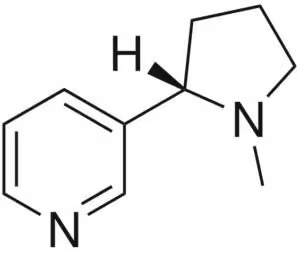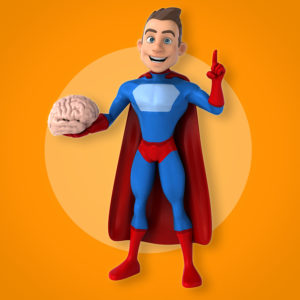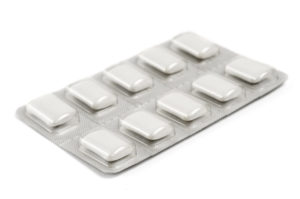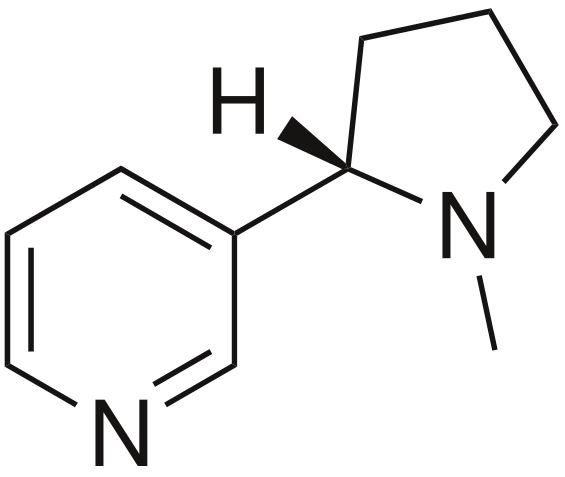Table of Contents
Click the image above or watch on YouTube
Key Takeaways
- Nicotine has been used for thousands of years for its nootropic properties such as improving concentration, memory, motivation, and mood.
- As a nootropic, nicotine is typically dosed at 1 – 2 mg
- Despite the cognitive benefits of nicotine, it is not recommended to smoke tobacco due to the harmful effects.
- Nicotine can be addictive and cause side effects like increased heart rate, high blood pressure, gastrointestinal problems, and it may promote tumor growth, so its use requires caution.
Nicotine (3-(1-Methyl-2-pyrrolidinyl) pyridine) is an alkaloid found in tobacco leaves. And has been used by humans for its psychoactive (nootropic) properties for thousands of years.
But it is only in the last several decades that nicotine’s mechanism of action in the brain has been revealed.
Nicotine works primarily by upregulating nicotinic acetylcholine receptors (nAChR) in the brain. Increasing neural signaling of neurotransmitters and boosting alertness, cognition and memory.
Studies have shown however that this upregulation of nAChR is dose dependent. And too much nicotine desensitizes these receptors.[i] So low doses of nicotine are key in using nicotine as a nootropic for cognitive benefit.
Since we’re investigating nicotine as a nootropic here, it’s important to point out that I am not encouraging smoking. Smoking tobacco has been shown to increase cognition.
But the harmful effects of tobacco have been proven extensively.[ii] Including this study that showed life-time smokers have less gray matter in the prefrontal cortex compared to non-smokers. Affecting the brain’s reward, impulse control and decision-making circuits.[iii]
Nicotine as a nootropic helps:
- Memory. Nicotine improves short and long-term memory. Nicotine affects nicotinic receptors which increases the use of neurotransmitters that helps with memory formation. And induces long-term potentiation which helps encode long-term memories.
- Neurotransmitters. Nicotine binds to nicotinic acetylcholine receptors in the brain. Boosting the release of acetylcholine (ACh), dopamine, serotonin, and glutamate. Affecting alertness[iv], attention, cognition, memory and mood.
- Brain Optimization. Nicotine modulates the connectivity and structure of brain networks. And improves whole-brain communication efficiency. Boosting overall cognitive and brain function.[v]
Overview
Nicotine (3-(1-Methyl-2-pyrrolidinyl) pyridine) is an alkaloid found most famously in tobacco leaves. But nicotine is also present in very small amounts in plants from the Solanaceae or nightshade family including potatoes, tomatoes and eggplant.[vi]

Nicotine acts on acetylcholine (ACh) receptors in your brain. Stimulating and regulating the release of a host of neurotransmitters including serotonin, dopamine and norepinephrine.
New drugs derived from nicotine and the research on nicotinic receptors are in clinical trials for Alzheimer’s, ADHD, anger management, anxiety, depression, schizophrenia, Tourette Syndrome and wound healing.[vii]
As a nootropic, we’re talking about using a nicotine lozenge or gum for cognitive function enhancement. I am NOT talking about smoking tobacco.
Smoking is the cause of 5 – 6 million deaths per year. Affecting 18 different organs in your body. But it’s not the nicotine in tobacco that kills.
The biggest issue with using nicotine as a nootropic is that it can be addictive. But it’s not the nicotine that causes cancer. Nicotine however could be a “tumor promoter”.
Nicotine binds specifically to the nicotinic acetylcholine receptor (nAChR) in your brain. And it deregulates essential processes like regulation of cell proliferation, apoptosis (programmed cell death), migration, invasion, angiogenesis, inflammation and cell-mediated immunity of stem cells, adult tissues and cancer cells.[viii]
As a nootropic, taking nicotine in smalls doses (i.e. 1-2 mg) and used occasionally helps when you need that cognitive boost. If you have cancer or a tendency to tumor growth you should avoid using nicotine.
How does Nicotine work in the Brain?
Nicotine boosts brain health and cognitive function in several ways. But two in particular stand out.
- Nicotine boosts memory. Nicotine binds to presynaptic nicotinic acetylcholine receptors in the brain. And boosts the release of acetylcholine (ACh), dopamine, serotonin, and glutamate.[ix] Neurotransmitters known to be involved in cognitive processes.
Problems with cholinergic signaling has been implicated in neurologic disorders including schizophrenia, ADHD and addiction. And much of the study of nicotine’s effects on cognition has been done looking for treatments for these disorders.[x]
The National Institute of Drug Abuse conducted a meta-analysis of 41 double-blind, placebo-controlled studies between 1994 and 2008. The analysis found significant positive effects of nicotine on fine motor performance, alertness, attention and accuracy, response time, short-term and working memory.[xi]
- Nicotine improves attention. Attention deficits are often associated with those dealing with ADHD. The inability to focus can cause all kinds of problems both in relationships, and on the job.
Nicotine has been shown to improve attentiveness in smokers. And helps alleviate attention deficits in Alzheimer’s Disease, schizophrenics and adults with ADHD.
A double-blind study conducted at Duke University Medical Center used nicotine patches to see if it would improve attentiveness in non-smoking adults without attention deficits. Subjects received 7 mg of nicotine per day using a transdermal patch for a 4 ½ hour morning session.
Nicotine significantly decreased the number of omission errors during testing. And in this study, decreased the variance in “hit reaction time” which is used a measure of attentiveness.
The study showed that nicotine reduced attention deficit, and even improved attentiveness in normal adult non-smokers.[xii]
How things go bad
As we get older, our brain chemistry and energy metabolism changes.[xiii]
↓ Acetylcholine signaling in the brain declines
↓ Dopamine, norepinephrine, epinephrine and serotonin levels decline
↓ Alertness, attention and memory declines
↑ Anxiety, depression and stress increases
All of these age-related changes are contributing factors to the neurodegenerative diseases of aging, including Alzheimer’s and dementia.
Nicotine benefits
Nicotine boosts levels of dopamine, epinephrine (adrenaline), norepinephrine and serotonin. And human cell lines in test tube studies as well as animal studies show nicotine stimulates the growth of new blood vessels. Even increasing the number of red blood cells.
Nicotine rapidly crosses the blood-brain barrier. Within 20 seconds of putting a nicotine lozenge under your tongue. It has the fastest action of any nootropic I have reviewed here on Nootropics Expert.
Alpha brain waves increase with nicotine which provides a relaxed state associated with super-learning, flow states and joy.[xiv]
Nicotine stimulates electrical and neurotransmitter activity throughout your brain. Helping alertness, mood, motivation, selective attention, sustained attention, and decreases distraction.[xv]
Nicotine helps pre-attentional processing which is your ability to detect information. It brings you down when you’re up. And it brings you up when you’re down. And it helps you cope with stress and anxiety.
And nicotine improves short-, long-, and working memory processes.[xvi]
How does Nicotine feel?
Neurohackers report nicotine improves mental clarity and motivation. Mood swings are minimized and less anxiety.
Concentration and focus significantly get a boost with nicotine as a nootropic.
All forms of memory get a boost with nicotine. Short and long-term memory. And working memory. Nicotine induces long-term potentiation in the hippocampus which is the basis for the neuroplasticity that helps encode long-term memory.[xvii]
The key with nicotine is to use low doses. And only use it occasionally. Too much nicotine desensitizes the alpha-7 nicotinic acetylcholine receptor. So tolerance is an issue. But your receptors recover fairly quickly if you give them a break for a day.
Nicotine Clinical Research
Much of the research conducted with nicotine was done with cigarette smokers. The studies were to determine the effects of abstinence (quitting smoking) on cognition. Or funded by tobacco companies out to prove smoking was good for you (i.e. improved cognition). Cigarette smoke is harmful.
So keep an open mind when reviewing these studies. My intent is certainly not to encourage smoking. But to show the effects of nicotine regardless of the delivery system to the human brain.
Nicotine boosts IQ
Researchers in New Zealand conducted a trial with 10 women and 6 men ranging in age from 18 – 32 years. All participants were smokers and were instructed not to smoke during the 2-hour period prior to the experiment.
Each subject completed the even and odd numbers of the Raven’s Advanced Progressive Matrices (APM) test in two sessions. APM is a test to measure intelligence (IQ).
In each of 2 experimental sessions, subjects were given 20 minutes to complete the assigned half of the APM. Before beginning the test, subjects took 6 puffs of a medium (0.8 mg) cigarette every 20 seconds. After 10 minutes, subjects were prompted to take 2 additional puffs.
Results of the experiment showed that APM scores were significantly higher in the smoking session compared to the non-smoking session. Suggesting that nicotine acts to enhance intelligence.[xviii]
Another study at the University of Colorado may explain part of this boost in IQ. Nicotine was found to increase the efficiency of neural communication between areas of the brain involved in cognition. And even the rest of the brain.[xix]
Nicotine improves typing speed
 Researchers conducted 5 experiments to study the effects of using 2 mg of nicotine on keyboard typing speed. In study after study nicotine produced a reliably consistent increase in typing speed.[xx]
Researchers conducted 5 experiments to study the effects of using 2 mg of nicotine on keyboard typing speed. In study after study nicotine produced a reliably consistent increase in typing speed.[xx]
Nicotine will also improve and increase the speed of your handwriting. Scientists in Germany noted that nicotine has consistently been shown to improve psychomotor performance. So they recruited 38 smokers and 38 non-smokers to participate in a study.
Both groups received gum containing 0, 2 or 4 mg of nicotine. And their handwriting performance was assessed after they chewed the nicotine gum. Subjects were asked to perform a simple writing task. Movement time, velocity and acceleration of handwriting movements were measured.
Nicotine reduced movement times, increased writing velocity and more fluid handwriting movements were observed. The results suggested that nicotine can enhance psychomotor performance to a significant degree in a real-lie motor task.[xxi]
Nicotine boosts memory
Nicotine has been shown to improve short-term and working memory in several studies. In this study conducted in the UK, researchers recruited 60 smokers and 60 non-smokers in a double-blind procedure.
Half of the subjects chewed nicotine gum and the other half chewed a placebo prior to performing a memory task. Results showed that nicotine significantly improves short-term memory.[xxii]
Nicotine for the treatment of ADHD
Several studies have shown the benefits of nicotine in treating the symptoms of ADHD. Focusing and memory break down in those of us with ADHD and ADD. And treatment with Ritalin, Adderall or other stimulants often corrects this inattentiveness and memory impairment. But it does nothing for the accompanying depression and anxiety.
And this is the reason many Adult ADHD sufferers smoke. This study showed that using a nicotine patch not only helped decrease anxiety and depression symptoms of ADHD. It also helped smokers stop using tobacco products while taking care of their ADHD symptoms.[xxiii]
In this study, nicotine was compared to the effects Ritalin and or a placebo had in treating ADHD. Nicotine improved performance and reduced errors. It decreased depression, and decreased overall severity of ADHD symptoms.[xxiv]
Another double-blind, placebo-controlled trial worked with 6 smokers and 11 nonsmokers with Adult ADHD. Nicotine decreased ADHD symptoms, increased vigor, and improved reaction time.[xxv]
Nicotine Recommended Dosage
Nicotine as a nootropic is dosed at 1 – 2 mg on an as needed basis.
Nicotine gum typically comes in 2 – 4 mg. You can cut a 4 mg piece of gum in half for a 2 mg dose. Gum releases the nicotine dose over the course of 20 – 30 minutes.
The problem with nicotine gum is aspartame along with other unhealthy sweeteners.
Nicotine patches come in varying strengths and usually contain more nicotine than gum or lozenges. Neurohackers (contrary to package warnings) cut the patch to size depending on the dose they want to use.
My preferred method is nicotine lozenges. Mini-lozenges are best because they’re not full of toxic chemicals like larger lozenges. The 2 mg mini-lozenge cut in half provides cognitive benefits within 10 – 20 minutes.
Nicotine Addiction & Other Side Effects
Nicotine is addictive primarily because it boosts levels of dopamine in your brain.[xxvi] Not nearly as addictive as smoking tobacco or chewing tobacco but addictive nonetheless.
Nicotine can cause increased heart rate, high blood pressure, dizziness, cough, sneezing, sinus problems, upset stomach, constipation, and headaches.
Nicotine does not “cause” cancer. But may be a tumor promoter. So if you had or currently have cancer you should avoid nicotine.
If you are dealing with a gut infection of H pylori bacteria, you should not use nicotine until you get this problem under control.
Type of Nicotine to buy
Nicotine used as a nootropic comes in gum, inhalers, lozenges, and transdermal nicotine patches.
See “Nicotine Recommended Dosage” for specific dosing instructions.
Nicotine Gum & Pouches
I have tried and recommend the nicotine gum by Lucy Nicotine. Lucy uses pharmaceutical grade nicotine and natural ingredients only in their pouches and gum. Check them out here: Lucy.co Nicotine.
Nicotine Spray
Nicotine spray is a newer option you may want to try. You get a 1 mg dose for each spray under your tongue (sublingually). Great for a quick cognitive boost and burst of energy. There’s about 100 sprays in each container.
Nicotine Vaping
Vaping is another option. But it can come with a host of potential issues if you’re not familiar with vaping. The safest option is rebuildable coils using stainless steel wire and organic cotton with vegetable glycerin as your nicotine base. And keeping the temperature low and power less than 4 volts.
Of course there is also cigarette smoking and chewing tobacco for your nicotine dose which I DO NOT recommend.
Nootropics Expert Recommendation
Nicotine 1 – 2 mg per dose
 I recommend using Nicotine as a nootropic supplement.
I recommend using Nicotine as a nootropic supplement.
Your body does not make nicotine on its own. So if you are going to supplement with nicotine, you must take it as a supplement.
Nicotine is helpful for those dealing with short-, long-term and working memory problems, low energy, depression or anxiety.
Nicotine is especially helpful for dealing with the symptoms of Adult ADHD. Nicotine can help relieve many of the symptoms of ADHD. And is a good compliment to your existing ADHD meds.
While nicotine is a powerful cognitive enhancer, it is also addictive and can lead to tolerance and withdrawal symptoms in some people. So caution is advised. And if you’re prone to addiction please stay away from nicotine as it can lead to nicotine addiction.
As neurohackers, we have great acetylcholine agonists available to us if you don’t want to experiment with nicotine. Most of the racetams will boost acetylcholine use in the brain.
I suggest starting with a dose of ½ – 1 mg of nicotine in mini-lozenge or spray form. Nicotine will compliment nearly everything in your current nootropic stack.
There is no benefit to dosing more than 2 mg of nicotine for cognitive benefit. And too avoid addiction and tolerance we suggest only using nicotine occasionally.
I have tried and recommend the nicotine gum by Lucy Nicotine. Lucy uses pharmaceutical grade nicotine and natural ingredients only in their pouches and gum. Check them out here: Lucy.co Nicotine.










Join The Discussion - 124 comments
Beate
August 11, 2022
Hello David,
not sure if this was already asked, but in searching I can’t find a clear answer to this: are nicotine and Nicotine Polacrilex the same? Do they have the same affect?
Thanks so much! – love your site!!
David Tomen
August 14, 2022
Beate, it is nicotine bound to polymethacrylic acid which helps deliver nicotine into cells and is used in nicotine gum or lozenges for that reason.
Danny O
August 10, 2022
I quit smoking cigarettes 15 years ago and it was the single best thing I’ve ever done for my general health, but one noticable effect was how I played chess changed after quitting. My focus and concentration were simply not the same when playing in tournaments. Fortunately I heeded David’s advice and now take a stack that has mitigated things and improved my game. I will now try adding a 2mg dose of nicotine before my tournaments to see how it affects my game. Thank you David!
David Tomen
August 11, 2022
Thanks Danny
Adela
May 21, 2022
Hello David, I would like to know two things please:
Do you consume dynamine? And if not, why don’t you recommend it?
Do you recommend the use of Polygala? And how much per day?
David Tomen
May 22, 2022
Adela, I do not use Dynamine (methylliberine) and have never had a reason to do so.
And I’m editing a Polygala review right now which I’ll hopefully get published some time next week. So stay tuned!
Karine Berube
May 7, 2022
Hi David !
I need help on nicotine please.
I smoke since since 30 years. I have been able to quit a few time in the past. But now it is more difficult.
Is B3 nicotinic acid could help me ? I don’t want tryptophan, tyrosine or theanin. All the others type of supplement are ok.
I want to succeed this time and that it can be more easily to quit. My lungs are crying right now.
I am open to any suggestion you can give me, I have enough of the cigarette.
Thanks so much and have a good day !
David Tomen
May 7, 2022
Karine, I’m not sure if niacin will help but it’s worth a try.
BTW, Inositol has been found to help reduce the chances of lung cancer caused by smoking (https://nootropicsexpert.com/vitamin-b8-inositol/). And NAC may help reduce the cravings for it: https://nootropicsexpert.com/n-acetyl-l-cysteine/
Karine Berube
May 9, 2022
Thank you so much again for you help !
I appreciated !!
Have a good day !
Randy Brackett
May 7, 2022
Hi David,
I am 58 years old and was diagnosed at age 12 with Tourette Syndrome although the motor and vocal tics began at age 6. Since my mid 20s the tics have significantly waned but I still struggle with the comorbid issues that accompany TS; attention related issues, OCD tendencies, no motivation.
I have very recently become aware of the nootropic community and am doing a lot of reading trying to put the pieces together. I’m mainly trying L Theanine and caffeine. However I’m curious is 2mg nicotine lozenges may help some of these issues I’m dealing with.
I appreciate your professional approach as I have been watching your videos on YouTube. Your input would be greatly appreciated.
Thanks!
Randy Brackett
David Tomen
May 7, 2022
Randy, you can try it. I think there are clinical studies going on trying nicotine for Tourette Syndrome but I have not seen any conclusions on whether it would work.
Low GABA levels are associated with Tourette’s so you may want to try supplementing with PharmaGABA and/or L-Glutamine. And there are anecdotal reports from some people successfully using Phosphatidylserine (PS) as well. I’ve written reviews for each of these supplements so look them up here before you decide: https://nootropicsexpert.com/nootropics-list/
Noah
February 6, 2022
Hey Dave, I can’t begin to tell you how grateful I am for your website. You’re a beacon of hope for so many people and I always encourage people to check out your site. You have helped me so much. I have a huge passion for researching nootropics and they have helped me overcome many obstacles in life. I have overcome a serious drug addiction, though I will say I am recovery, because you’re never fully cured. It’s like being in remission from cancer, you always need to stay vigilant and stick to a recovery pathway. Anyway, my deepest gratitude to you sir. My question regarding nicotine is, we know that it is indeed a nootropic if consumed appropriately via patches, gum, nicotine pouches, etc. My question is, is nicotine by itself really any worse than caffeine? There’s so much misinformation surrounding nicotine itself and it’s super frustrating to research it, without running into studies that demonize nicotine because of it’s association with tobacco. There’s reports that nicotine can cause hair loss because it constricts blood flow to the scalp, but I’m not sure if the studies refer to tobacco or nicotine? Can you offer your thoughts on this? I’m not losing my hair, in fact I have a thick and full head of hair, but I do want to take precautions. By the way, you have an incredible head of hair haha. Cheers!
David Tomen
February 7, 2022
Noah, nicotine is a great nootropic because you have two kinds of acetylcholine receptors: nicotinic and muscarinic receptors. The only thing is nicotine is addictive and if you are in recovery you need to be careful with it. That is the only negative thing concerning nicotine.
Lisa
October 28, 2021
This is great info! I love everything on your site. I’ve already spent hours reading up on a lot of things you suggest for stacks. Myself and my son have ADHD and we both take meds ( I’m on Adderall and he is on Vyvanse). I am trying to wean down on adderall and have found the patch works great to help with this. I did try about 2mg on my son and found it made him dizzy but he became more empathetic for several days after??? Our biggest problem with the meds for him is he while he can focus he still doesn’t have a drive and motivation to get things done. He sure can hyperfocus, especially on things he loves doing, but that’s about it. Is there something I can give him for this to activate a different part of the brain? He still struggles with negativity to some degree and obviously worse when coming down from Vyvanse so we do L-tyrosine to help. We also do magnesium and b vitamins, especially P5P. I have tried 5-htp and do give it occationally to help balance the dopamine his is getting. Any nootropics that could help?
Lisa
October 28, 2021
I should also say my son is 13 years old so not a little boy but in the midst of puberty, haha.
David Tomen
November 1, 2021
Lisa, sounds like your on track with supplements that support stimulant use. Timing is important because the L-Tyrosine you take at 8 am is gone by noon. So you need to take another dose the last the afternoon.
L-Tryptophan is a better way to increase serotonin than 5-HTP and to keep serotonin in balance with dopamine. You should also be supporting acetylcholine with Alpha GPC and ALCAR. And Phosphatidylserine (PS) and DHA (Omega-3) along with Lion’s Mane Mushroom extract will keep brain cells healthy esp. from stimulant use.
SouthAmericanMan
April 29, 2022
Hello, I am in a South American country with a very restrictive policy and education towards supplements and nootropics, and it is very difficult = very(!) expensive to buy any Choline sources such as Alpha GPC, CDP Coline or C.B. (at least 3-5 times more expensive, plus it takes weeks to get it, etc.) – I can’t eat more than 2-3 eggs/daily. And I wonder if there is any way, any trick, tool to have an alternative choline source while using nootropics such as nicotine, (ar)modafinil, piracetam which I can get by prescription luckily.
David Tomen
April 30, 2022
There is no “trick” to substituting something else to get the choline that you need. Can you get Choline Bitartrate or Choline Citrate in your country? If you can you just need to use higher doses to get the same effect as with Alpha GPC or CDP-Choline.
Josh
July 5, 2021
Hey Dave,
First time on the site, great to see how active you are. I’m the kinda guy who always has minerals and nutrients ‘topped up with the basics’ before I experiment ie – always having daily multivitamins and greens for my body. Therefore I’m intending to build a base brain stack before introducing nicotine.
Is there anything you have tried/recommend to pair with nicotine in order to keep the brain ‘topped up’ in the same manner I approach my bodies supps?
Note I’m already taking the adaptogen (ashwagandha, Rhodiola) & mushroom (lions mane) route at the moment. Mostly a fan of naturopathy and the ayervedic approach.
David Tomen
July 5, 2021
Josh, nicotine attaches to nicotinic acetylcholine receptors which boosts the release of most major neurotransmitters so nearly anything that affects the human brain can be stacked with it.
Josh Hardy
July 5, 2021
Amazingly fast reply, Dave, appreciate it a lot!
I’ve bought some nicotine spray and gums to trial. Thanks for your help and enthusiasm to create this blog.